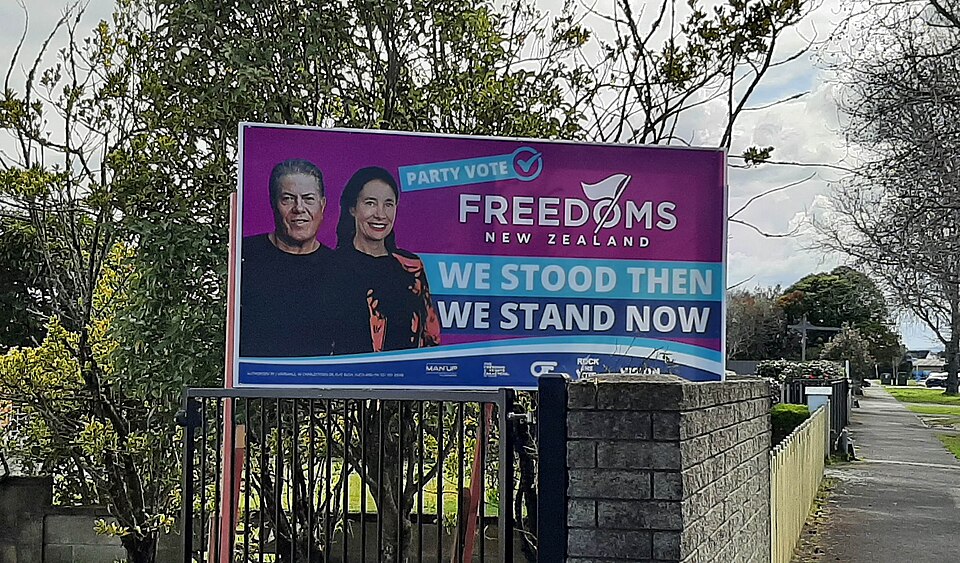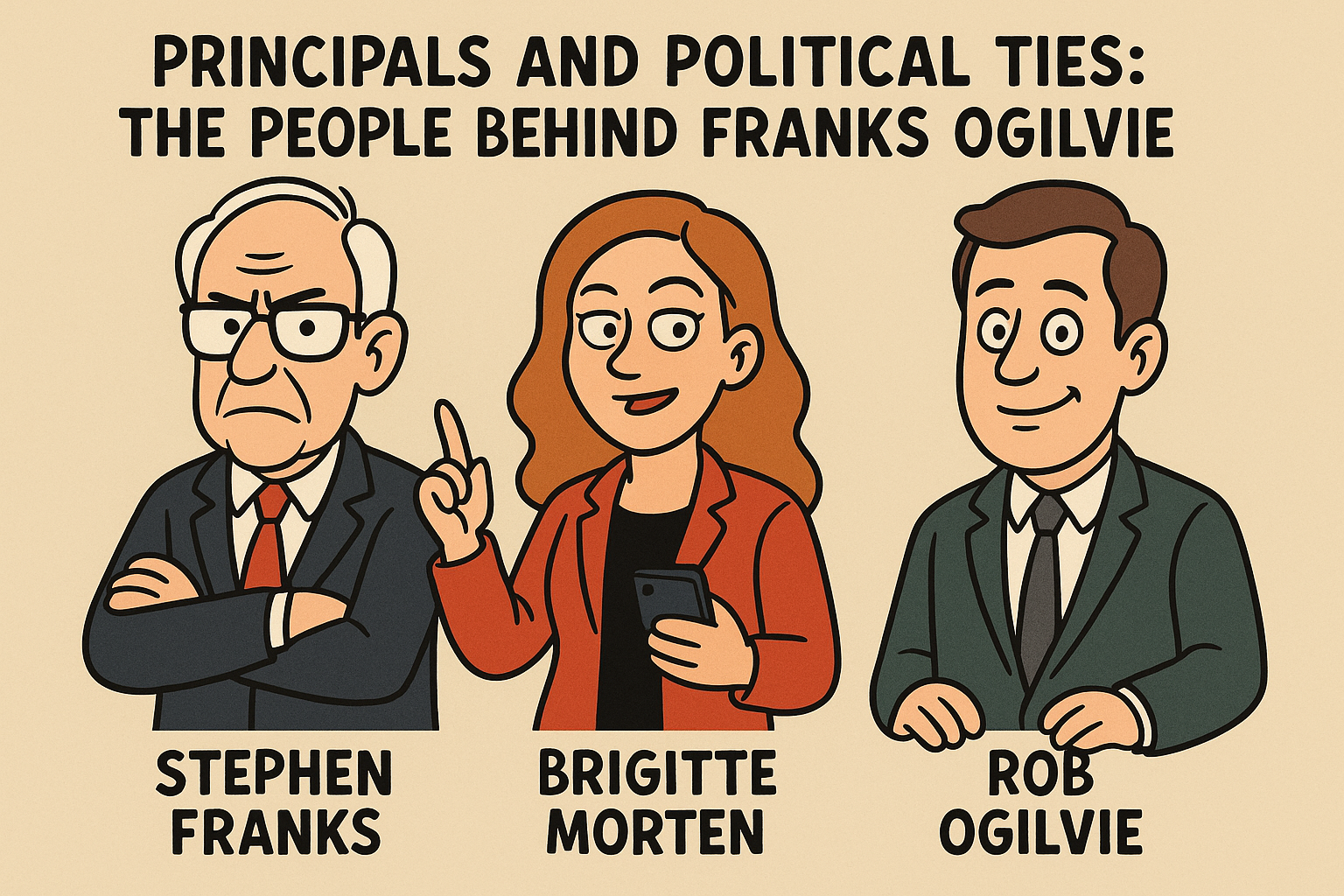Political and Ideological Alignment
The Inflection Point network’s ideology sits broadly within the right-wing, socially conservative, and populist spectrum of New Zealand politics. Its various members have alignments with different political parties and movements, notably NZ First, the National Party (conservative wing), the ACT Party, and minor Christian parties. Here’s how those alignments manifest:
New Zealand First (NZF): Perhaps the closest alignment as of 2025. NZ First, led by Winston Peters, has often campaigned on nationalist, anti-“woke” themes. During the 2023 election, NZF took a hard line against “radical gender ideology” – Peters railed against allowing gender self-identification on birth certificates and promised to “protect women’s spaces.” NZ First’s manifesto and public statements echoed many of IPNZ’s talking points. A concrete linkage is Casey Costello, long-time Hobson’s Pledge spokesperson, who became NZ First’s #3 list candidate and won a seat. She is now an NZF MP and even a Minister for Seniors in the coalition government (National-ACT-NZ First). Costello’s presence inside NZF’s caucus effectively carries the Hobson’s Pledge and broader conservative advocacy agenda into government policy discussions. Indeed, in early 2024 NZ First MPs submitted the “Women’s Bill” to legally define male and female (the bill Ro Edge supported). This was seen as a direct response to concerns raised by groups like IPNZ. NZ First also vocally opposed conversion therapy bans and proposed a referendum on the Treaty (aligning with Hobson’s Pledge) – showing how across issues of culture (race, gender), they align with this network. Winston Peters himself has a history of anti-establishment rhetoric and courting the evangelical vote (he worked with Brian Tamaki in 2020, briefly, until a falling out). Post-2023, Peters and Tamaki publicly reconciled, with Tamaki urging his followers to support Peters. This indicates a strategic alliance: Peters’ NZF provides the political power, and Tamaki’s movement provides grassroots fervor. Ideologically, both appeal to older, socially conservative voters who feel disempowered by liberal changes.
National Party: The centre-right National Party is a broad church, but the faction relevant here is its conservative wing. Under leader Christopher Luxon (a Christian conservative, though pragmatically centrist in governance), National has tread carefully on culture war issues. Officially, National supported banning conversion therapy and did not campaign against transgender rights. However, it promised to repeal parts of the radical Three Waters co-governance reforms (a win for Hobson’s Pledge goals). And Luxon repeatedly emphasized “parental rights in education,” hinting at discomfort with gender ideology in schools – a nod to IPNZ’s concerns (though he avoided specifics). Individual National MPs like Simon O’Connor (when he was in caucus) and Maureen Pugh have voiced skepticism of climate change and gender policies, aligning with the network’s views. Post-election, with NZF and ACT as coalition partners, National has agreed to some socially conservative policies: e.g., a referendum on Treaty principles is on the agenda (Hobson’s Pledge’s primary demand). National also agreed to review parts of the self-identification law (Births, Deaths, Marriages Registration Act changes) as part of coalition deals – a direct concession to concerns of IPNZ/Family First. Ideologically, while the National Party mainstream is pro-business and centrist on social issues, it is currently compromising with its right flank, which creates space for IPNZ’s ideas. Moreover, key figures like Stephen Franks are former National candidates, and others like Matthew Doocey (a Nat MP) attended private meetings with gender-critical feminists (according to insider reports). So, National is not publicly championing IPNZ’s cause, but it’s not opposing it either. The alignment is one of tolerance and subtle influence – expecting National to quietly implement some demands (like stricter health protocols for youth gender treatment, which Luxon indicated support for reviewing after the Cass report).
ACT Party: ACT (libertarian-right) has a dual character – economically laissez-faire, but also increasingly anti-“woke” under leader David Seymour. ACT’s leader and some MPs have explicitly engaged with gender issues. Notably, ACT proposed in 2023 to require Family Court approval for under-18s to access puberty blockers – effectively a major restriction aligned with IPNZ’s goals. Seymour cited international evidence (like the UK and Sweden’s moves) in his reasoning, much as IPNZ does. ACT’s deputy leader Brooke van Velden, however, is socially liberal (she was a supporter of LGBT rights), so there’s internal nuance. But ACT’s newest MPs include some strongly conservative voices. For example, Karen Chhour (ACT MP) has been critical of special treatment for Māori and could sympathize with “one law for all” rhetoric. Stephen Franks’ influence is also here: many ACT policies on law and order echo his suggestions. ACT also partnered with NZTU on some campaigns (Seymour spoke at NZTU events on fiscal issues), showing cross-over. Ideologically, ACT frames opposition to gender ideology as a matter of protecting children and rational science – an interesting fusion of populist and technocratic. They also champion free speech absolutism, opposing hate speech laws – working closely with the Free Speech Union (which as noted is run by allies of NZTU/ACT). Thus, ACT provides a libertarian justification for many of the network’s positions (e.g., “the state shouldn’t push gender ideology on kids” or “parents’ rights are being violated”). Politically, ACT’s leverage in the coalition is significant; they likely will push for the health system to adopt an approach more like the UK’s (restrict youth transitions) and for the education system to allow parental opt-outs on gender content – both wins for IPNZ if achieved.
Destiny Church / Freedoms NZ Parties: Though not in Parliament, Destiny’s political endeavours align perfectly with the network’s ideology. Brian Tamaki’s Vision NZ party (and later Freedoms NZ umbrella) campaigned on (1) Christian family values (stop “rainbow agenda”), (2) anti-vaccination/anti-mandate freedom, (3) anti-co-governance and Treaty “separatism”. These are basically an amplified version of what Family First, the Freedom & Rights Coalition, and Hobson’s Pledge respectively push. In 2023, Tamaki threw support behind smaller parties and implicitly NZ First after his coalition failed to gain traction. The synergy is that Destiny can act as an outside pressure group – its rallies demand more radical action than perhaps NZF or National would take, thereby shifting the Overton window rightwards. The ideological alignment is exact on social issues; the difference is style and extremity. Tamaki brings a religious framing (“this is a fight of good vs evil”), whereas a secular group like IPNZ frames it as “science and protecting kids”. However, both end up advocating the same policies (e.g., no puberty blockers, no gender self-ID, etc.).
Atlas Network ideology: Indirectly, via NZTU and affiliated think tanks (New Zealand Initiative), the network plugs into global classical-liberal or neoliberal ideology which prioritizes individual liberties, parental choice, and skepticism of collectivist or identity-based policies. This is why the NZTU and Free Speech Union, though not explicitly anti-trans, fall in line with opposition to hate speech laws and “compelled speech” (like pronoun usage policies). The Atlas influence is to provide intellectual justifications: e.g., citing John Stuart Mill on free speech, or pushing back on “Critical Theory” in institutions – which dovetails with IPNZ’s stance that “critical social justice ideologues” are harming society.
International Populist Alignment: Globally, the positions of this network align with populist right movements – think Trumpism in the US (anti-PC, anti-trans in sports, etc.), right-wing UK Tories or Gender Critical feminists (like those around J.K. Rowling), and even Eastern European governments (which ban gender education). The mention of groups like caWsbar and Atlas shows they see themselves in a global struggle against both “woke cultural Marxism” and “globalist elites,” a common populist narrative.
Notable ideological throughlines across the network:
A belief in “One law for all” – whether in context of race (Hobson’s Pledge) or gender (they reject laws/policies that differentiate gender identities).
Emphasis on free speech and open debate – they position themselves as silenced truth-tellers, hence the summit title “Unsilenced” and constant references to cancel culture.
Protection of children – this is repeatedly invoked. IPNZ: “protect children from indoctrination/medical harm”; Family First: “think of the children” approach to censorship and sex ed; Destiny: “save our children from moral decay”; NZTU even: “don’t burden future children with debt” (in fiscal terms). This serves as a unifying moral high ground.
Anti-elitism – They frequently contend that the media, academia, and bureaucrats (“expertocracy”) are imposing values against the will of the majority (hence IPNZ’s tagline of representing the silent majority). This aligns with NZ First’s anti-establishment messaging and ACT’s criticism of “Wellington bureaucracy”.
Nationalism and Conservatism – There’s a clear patriotic tone: use of Kiwi imagery, talk of “middle New Zealand”, invoking Kiwi common sense against foreign ideologies. Hobson’s Pledge explicitly nationalistic (we’re one people). Destiny wraps itself in the NZ flag at protests. This nationalism also means they bond with similar foreign groups (like they see UK’s gender debate or Canada’s as parallel fronts, not as adversaries).
Potential Frictions: It’s worth noting not all these alignments are perfectly smooth. Within the network:
The secular/libertarian wing (NZTU, some ACT folks) might be uneasy with the overt religious elements (Destiny).
The ethnic dimension: Hobson’s Pledge’s anti-Māori stance could alienate Māori members of the anti-trans cause (like Di Landy is Māori but she’s also against what she sees as misuse of Māori concepts by “woke” – she likely reconciles by saying Treaty doesn’t require co-governance).
Labour Party alignment: Jan Rivers remains a Labour member imploring her party to change. Currently Labour (now in opposition) is more aligned with trans rights (the Ardern government passed self-ID and conversion therapy bans). So Labour’s official stance is opposite IPNZ’s. Rivers and any Labourites in the network are a dissident minority within their sphere.
However, the current government (2023–2026) is a coalition of National (centre-right), ACT (right-libertarian), and NZ First (populist-right). This is the most favorable political landscape the network has seen. Already we see:
The government paused or is reviewing the rollout of new school curricula on relationships & sexuality, likely incorporating IPNZ input.
The Health Ministry under new leadership is more open to conservative consultation on trans healthcare (e.g., setting up an external advisory panel on youth gender services).
Police and Charity regulators are less inclined to pursue groups like Destiny or Family First (e.g., there’s talk Family First might attempt to re-register as a charity under a friendlier government).
One should also watch the New Conservative Party (renamed or merged possibly) – although they failed electorally, they share the ideology. Some network folks (like an Elliot Ikilei of New Conservatives) are in informal collaboration with these groups on specific events.
Internationally, Atlas Network alignment means NZ activists sometimes get platforms on overseas media: for example, Taxpayers’ Union staff writing op-eds in Wall Street Journal (it happened re: NZ’s COVID response), or Family First people on Fox News (Bob McCoskrie was quoted on a Fox Digital story about trans issues). The Atlas and related networks (Heritage Foundation, ADF International, etc.) often lend legal help too – there are rumours that an international law group offered to support litigation if any detransitioners sued the NZ health system (which IPNZ alluded to in their letter).
In summary, politically the Inflection Point network is aligned with the rightward shift in NZ politics post-2023. They have allies in power (NZF, ACT, and sympathetic Nats), and their ideology fits into a global right-wing narrative. This alignment gives them an unprecedented chance to influence policy – effectively, 2024–2025 is the “inflection point” they hoped for, where the tide turns in their favor. The challenge for them will be to ensure the government follows through amid other priorities. But with Winston Peters and David Seymour keen to satisfy their base, Inflection Point’s wishlist (curtailing youth gender transitions, banning any suggestion of teaching gender fluidity in schools, bolstering free speech laws) has a real shot of being implemented in some form in the next couple of years.


Comments